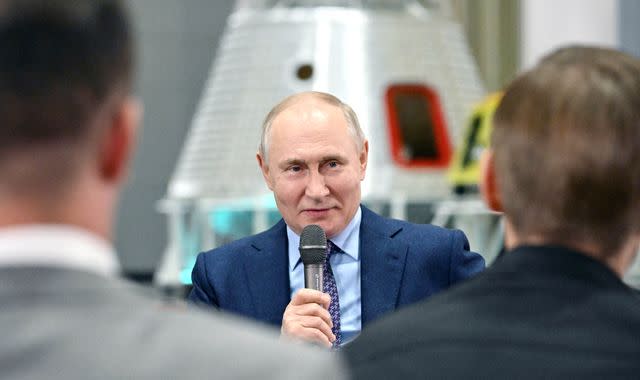Vladimir Putin sets date for launching Russia's new space station

Russia's new space station will come online in 2027, Vladimir Putin has said.
Moscow's Roscosmos space agency committed to building its own orbital outpost last year, when it announced its departure from the International Space Station (ISS).
Speaking during a visit to a rocket corporation in Korolyov, outside Moscow, Mr Putin said: "As the resources of the ISS run out, we need not just one segment, but the entire station to be brought into service.
"And in 2027, the first segment should be placed in orbit."
The ISS been a symbol of international diplomacy and collaboration since launching in 1998, but Russia said it would leave the project after being largely cut off from the West following the war in Ukraine.
However, it will remain on board until 2028 - longer than initially planned.
Roscosmos boss Yuri Borisov said Russia must get its station up and running quickly or risk falling behind its rivals, including a joint project by the US, European, Canadian, and Japanese space agencies.
"The ISS is getting old and will come to an end sometime around 2030," he said.
"If we don't start large-scale work on creating a Russian orbital station in 2024, it is quite likely we will lose our capability because of that time gap."
The ISS is one of only two space stations in orbit, along with China's Tiangong Space Station.
Private firms are also keen on building their own, however, as the cost of getting into space continues to decline.
Putin committed to space exploration
Mr Putin said Russia also remained committed to its moon landing programme, despite the failure of its Luna-25 mission earlier this year.
"Mistakes are mistakes - it is a shame for all of us," he said.
"This is space exploration and everyone understands that. It is experience we can use in the future."
Luna-25 was the country's first to the lunar surface in almost 50 years and aimed to explore its south pole for signs the moon could support a permanent human base.
But it crashed before it could safely touch down, leaving a crater later spotted by NASA scientists.
India succeeded where Russia had failed just days later, making history in the process.


